Term 2 Chapter 2 | 4th Social Science - Physical Features of Tamil Nadu | 4th Social Science : Term 2 Unit 2 : Physical Features of Tamil Nadu
Chapter: 4th Social Science : Term 2 Unit 2 : Physical Features of Tamil Nadu
Physical Features of Tamil Nadu
Unit 2
Physical Features
of Tamil Nadu
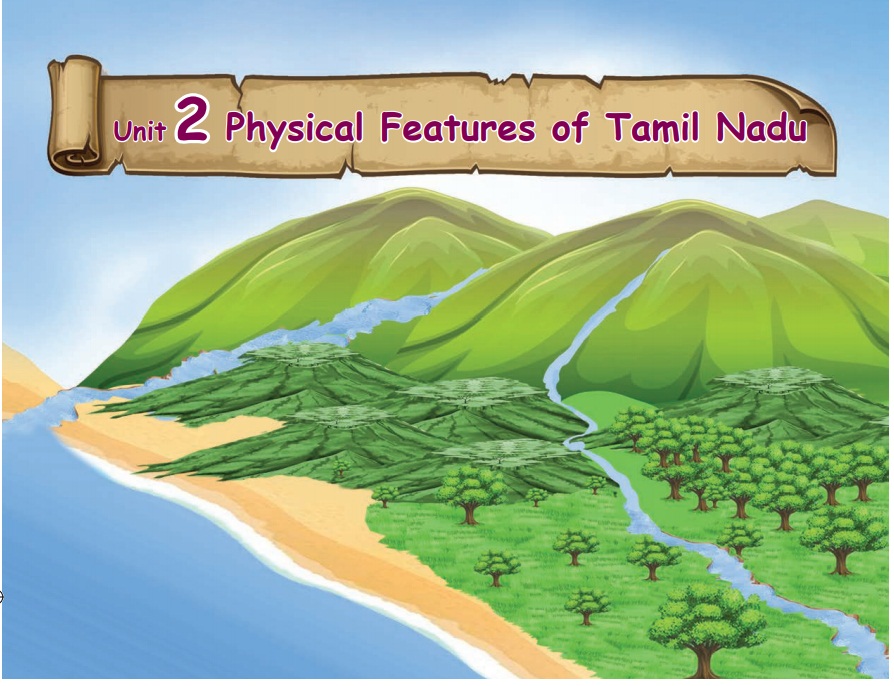
Learning
Objectives
Children will be able to:
•understand the physical features of Tamil Nadu.
•locate mountain, plateau, plain and coastal regions
in Tamil Nadu.
•describe the features of mountains, plateaus,
plains and coast.
•explain the types of forests found in Tamil Nadu.
Our state
Tamil Nadu is located in the
South of India. It is the eleventh largest state
in India.
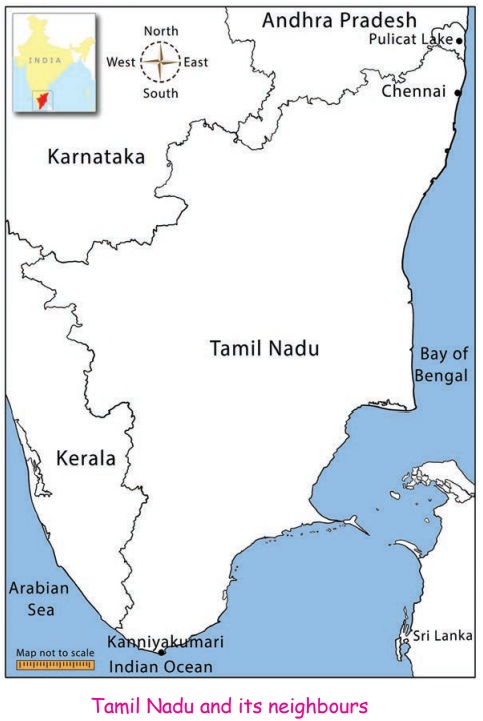
Tamil Nadu and its
neighbours
It shares boundaries with
• Andhra Pradesh on the North
• Karnataka on the North west
• Indian Ocean on the South
• Kerala on the West
• Bay of Bengal on the East
Tamil Nadu extends upto
Kanniyakumari which forms the southern most tip of India. It is the meeting
point of Arabian Sea, Indian Ocean and Bay of Bengal.
The Pulicat lake is situated at the northern end of Tamil Nadu.
DO YOU KNOW?
Tamil Nadu had 32 districts. Recently ,government announced 3 more districts namely Kallakurichi, Chengalpattu and Tenkasi. At present(2019) there are 35 districts.
Activity
1. On the political map of India shade any two neighbouring States of Tamil Nadu.
2. Mark the Indian Ocean, the Arabian Sea and the
Bay of Bengal on the map.
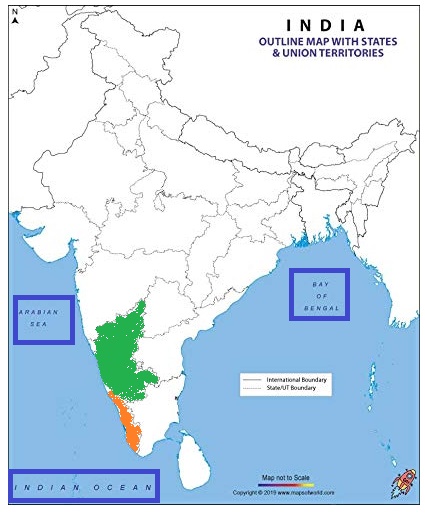
Do You Know?
The Madras Presidency called as Tamil Nadu
comprised of Andhra Pradesh, Karnataka, Kerala and Odisha. Later in 1953,
Telugu speaking region of the state was split to form Andhra Pradesh.
Similarly, in 1956, Malayalam and Kannada speaking regions of the state were
split into Kerala and Mysore.
Landscape of Tamil Nadu
The landscape of Tamil Nadu can
be divided into four categories namely:
1. Mountains
2. Plateaus
3. Plains
4. Coast
1. Mountains
Tamil Nadu is the only state in
India which has both the Western ghats and Eastern ghats. They meet at the
Nilgiri hills in Tamil Nadu. Doddabetta is the highest peak in Nilgiri hills.
Tamil Nadu has various hill stations like Ooty, Kodaikkanal, Kolli hills,
Kothagiri and Yercaud.
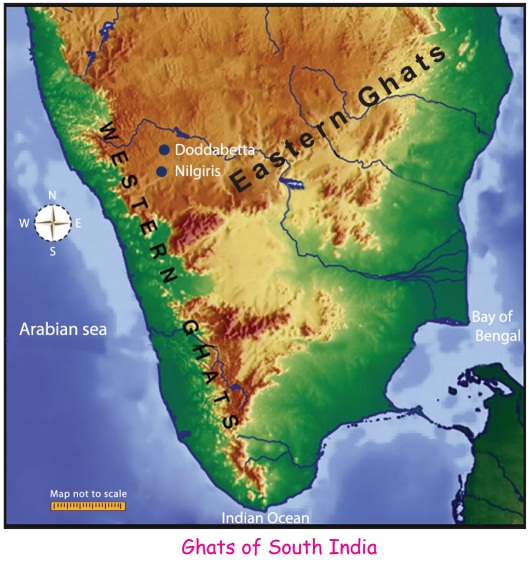
The Eastern ghats do not get
enough rainfall unlike the Western ghats which receives lot of rainfall. The
plantations grown in these ghats include tea, coffee and spices.
Tamil Nadu has rich flora and fauna. Mudumalai wildlife sanctuary, Indira Gandhi wildlife sanctuary and National park in Anaimalai are in the Western ghats of the state. There are a variety of plant species found in them. The Kurunji shrub is the most special of them all. Kurunji flowers blossom once in 12 years.
Try to Answer
1. Where do the Western ghats andEastern ghats meet
?
Answer: Nilgiri hills.
2. Name any two wildlife sanctuaries inthe Western
ghats of Tamil Nadu.
Answer: Mudumalai wildlife sanctuary, Indira Gandhi wildlife
2.
Plateaus
There are three plateaus in Tamil
Nadu namely Bharamahal plateau, Coimbatore plateau and Madurai plateau. There
are many small hills between these plateaus. Chennimalai is one among those
hills in Erode.
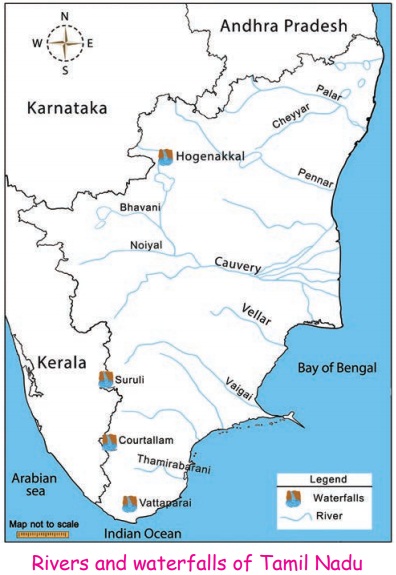
3.
Plains
Plains in Tamil Nadu can be
divided into river plains and coastal plains.
a)
River plains
Rivers
Palar, Cheyyar, Pennar and Vellar form the Northern plains. The middle river plain is formed
by Cauvery
and its tributaries. River Vaigai and Thamirabarani form the Southern plains.
River Cheyyar is a tributary of River Palar. It is a seasonal river that flows through the district of Tiruvannamalai.
Rivers and waterfalls of Tamil Nadu
b)
Coastal plains
Coastal plains of Tamil Nadu are
also called Cholamandalam plains which extend from Chennai to Kanniyakumari.
4.
Coasts
Tamil Nadu has the third longest
coastline in India. The coastal region extends from Chennai to Kanniyakumari.
Pamban island forms a part of Ramanathapuram. It separates Gulf of Mannar and
Palk strait. 13 districts share the coastline.
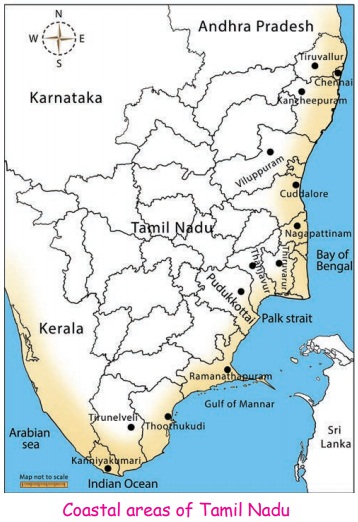
The notable beaches of Tamil Nadu
are:
a) Marina Beach, the second
longest urban beach in the world.
b) Rameswaram beach is famous for
its beautiful view.
c) Kanniyakumari beach is famous for its beautiful views of sunrise and sunset over the water.
Coastal areas of Tamil Nadu
DO YOU KNOW? Pamban bridge in Rameswaram is India‛s first sea
bridge opened in the year 1914.

Activity
On the district map of Tamil Nadu shade any three coastal districts of Tamil Nadu.
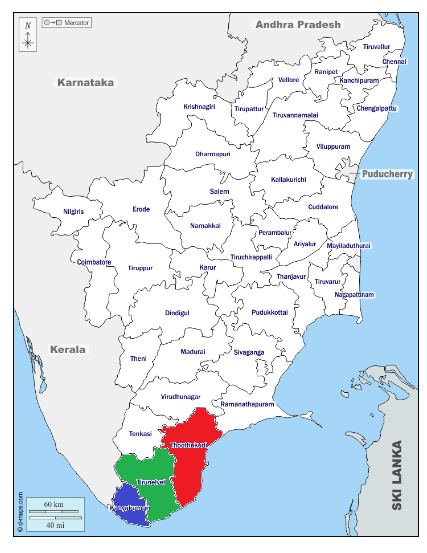
Do You Know? Droogs are steep rocks. Rock fort is a famous droog in Tiruchirapalli (Tamil Nadu).

Waterfalls of Tamil Nadu
Waterfalls is an area where the
river water flows down from a mountain. Tamil Nadu has several waterfalls. Some
of them are:
a) Hogenakkal
waterfalls is located in Dharmapuri on the River Cauvery. It is known
for bathing areas, boat rides and attracts many tourists all round the year.
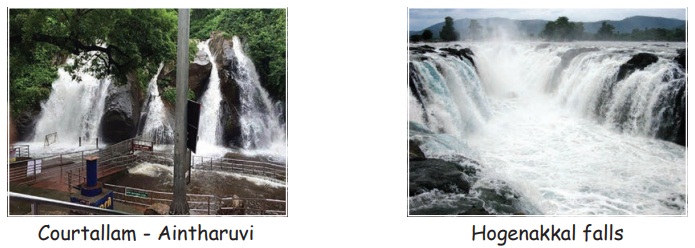
b) Courtallam
waterfalls is located in Tenkasi. It is in the Western ghats on the
river Chittar. There are a total of nine falls of which Peraruvi, Aintharuvi
and Puli Aruvi are the most prominent.
c) Suruli
waterfalls is located in Theni. Here the water falls from a series of
rock steps.
d) Vattaparai
waterfalls is located in Kanniyakumari. The falls is surrounded by
forest on all sides. People are allowed to take a natural bath here.
Try to Answer
1. Name some important rivers inTamil Nadu.
Answer:Palar, Cheyyar, Pennar, Vellar, Cauvery, Vaigai and
Thamirabarani.
2. Where is Courtallam waterfalls located?
Answer:Courtallam waterfalls is located in Tenkasi.
Climate of Tamil Nadu
Tamil Nadu experiences tropical
climate and there is very little difference between summer and winter. The
temperature during summer can rise up to 40°C (40 degree celsius). Due to its
location, Tamil Nadu experiences hot and humid weather almost throughout the
year with mild winter. Tamil Nadu is dependent on monsoon rains and often faces
droughts if monsoon fails.
Seasons of Tamil Nadu:
1. Winter season (January - February)
2. Summer season (March - May)
3. South West monsoon (June - September)
4. North East monsoon (October - December)
Try to Answer
1. During which months does the State receive rain
fall from South West monsoon?
Answer: June to September
2. Describe the weather of Tamil Naduin a sentence.
Answer: Tamil Nadu experiences hot and humid weather almost
throughout the year with mild winter.
DO YOU KNOW?
Thiruthani recorded the all-time highest
temperature of 48.6°C in May 2003.
Source: Indian Meteorological Department (IMD)
Forests
There are many types of forests
across Tamil Nadu. Most of these forests are found in the areas near the ghats.
These forests have so many types of trees. The topmost branches of the trees
form a continuous chain such that little or no sunlight hits the ground, this
is called canopy. The forests are divided
based on the canopy cover:
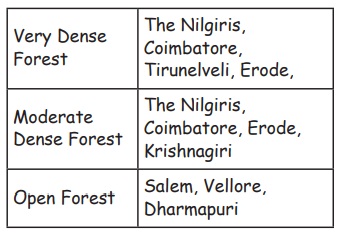
Very Dense Forest:The Nilgiris, Coimbatore,
Tirunelveli, Erode,
ModerateDense
Forest:The Nilgiris,
Coimbatore, Erode, Krishnagiri
Open Forest :Salem, Vellore, Dharmapuri
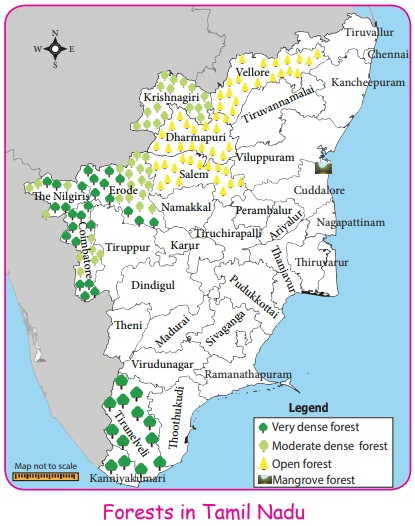
The forests can also be grouped as:
a) Evergreen
forests:
The word evergreen
means:
Ever (always) + green
= Always green
The trees in these forests have
leaves that are always green. In Tamil Nadu we find evergreen forests in the
Western ghats of Tirunelveli, Kanniyakumari, The Nilgiris and Coimbatore.
b) Deciduous
forests:
The trees in these forests shed their leaves during the dry season.

These forests are usually found
near the evergreen forests. They generally grow in the lower regions of the hills.
c) Swamp (Mangrove)
forests:
The word swamp means areas that
are low where water gets collected easily. These forests are usually found near
the beaches and river beds.
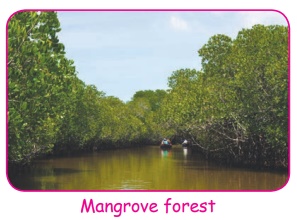
The Pichavaram mangrove forest is located near Chidambaram in Tamil Nadu.
Glossary
1. Flora and fauna - The plants
and the animals of an environment.
2. Ghat - A mountain pass /
mountain range.
3. Drought - A prolonged period
of very low rainfall.
4. Weather - The daily state of
the atmosphere, or air, in any given place.
5. Climate - The average of
weather conditions in an area over a long period.
Recap
•Tamil Nadu is located in the
South of India.
• Landscapes can be divided into four categories
namely mountains, plateaus, plains and coasts.
• Plains are found along the rivers and the
coasts.
• The coastline of Tamil Nadu is shared by 13
districts.
• Tamil Nadu has a tropical climate.
•Forests can be grouped as
evergreen forests, deciduous forests and swamp forests.
Related Topics